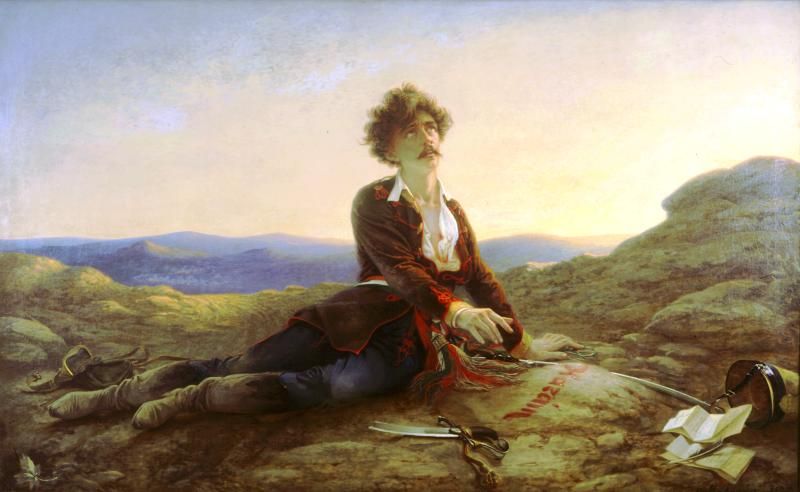Where and how did Sándor Petőfi die? – we remember the battle of Segesvár.
According to the current state of the "Petőfi file", we still know very little about the fate of the poet. Bem did not suffer a fatal defeat, yet the last moments of the freedom struggle came.
The "secret" of the emergence of the battle of Segesvár among the clashes in Transylvania is none other than the death of Sándor Petőfi, who, according to our current knowledge, fell on the battlefield. The battle itself was one of the significant but not decisive battles of the 1848-49 revolution and freedom struggle: on July 31, 1849, exactly 175 years ago, a handful of Hungarians led by General Bem were defeated by the Russians led by General Lüders and Eduard Clam- It was commanded by General Gallas from the Austrian army. The poet of the nation, Sándor Petőfi, died exactly 175 years ago today. Or not.
Upset situation in Transylvania and Görgey's "game plan"
Historians emphasize: after the Russian intervention - practically June 1849, although the decision was made earlier - the chances of Hungarian defense were best in Transylvania, where "the enemy's numerical superiority could be balanced by the advantages of the internal battle line." Let the numbers speak for themselves: Bem cakkumpakk could oppose 39,000 Hungarian soldiers and 107 guns against the 53,000 soldiers and 133 guns of the Russians and Austrians. At the same time, due to the Romanian uprising, Bem could march with 10,000 fewer men against the Russian-Austrian army. It is emphasized everywhere that
the most battle-hardened teams were missing at the critical moment,
since they were stationed in Temesköz. But there were so many people, there was nothing to do. The fate of the freedom struggle was already sealed months earlier, when the Austrians made a pact with the Russians over the Hungarians' freedom.
The Transylvanian commander,
József Bem's task was essentially to hold off the enemy until General Artúr Görgey performed a miracle on the Hungarian battlefield.
and find a way to win. But as we know, there are no long-term miracles in wars. You need ammunition, manpower, military equipment, and money, money, money for supplies.
Reckless Bem, hugely outnumbered, crushing Hungarian army
The Russian military movements finally forced the maneuvering Bem to engage east of Szeged. The Polish general believed that even before the battle he could unite his forces with other, smaller units stationed in the area, which would have given him a chance: 8,000 soldiers would have stood against 10,000. However, the Russian commander-in-chief, Lüders, prevented this scenario with clever tactics, cutting off the auxiliary armies from Bem's main force,
who eventually went into battle with 2,500 soldiers and 16 cannons.
The army was so modest in size that the Russians suspected a ruse.
Even the highly capable General Lüders couldn't believe his eyes: he spent most of the battle with his corps guarding the road to Marosvásárhely, from where he was waiting for the "main army". Nevertheless, the battle started favorably for the Hungarians: a Russian general was mortally wounded, Bem launched an attack against the Russian positions in the forest, but was repulsed.
In the end, Bem made a mistake, and this is how the already unequal fight was decided, which was due to the difference in numbers and the failure of the Hungarian cannons:
the Hungarian commander-in-chief believed that there were no more intervention forces at Segesvár, so he recklessly redeployed his forces and forced a breakthrough. A desperate fight began, which was decided by Lüders' 5,500-strong corps: they simply swept away the Hungarian left wing, completely weakened by the redeployment, and then broke the home guards with a lightning-quick cavalry charge.
The Hungarian army collapsed after 5 o'clock in the afternoon due to multiple overpowering,
and began to flee in panic in the direction of Fehértemplom.
It ended up being a massacre. The Cossacks launched a manhunt against the retreating Hungarians, and bloody rear-guard battles took place in the vicinity of Segesvár. It must have been an amazing confusion: the Hungarian cavalry ran over the fleeing Home Guards, the commander-in-chief József Bem fell from his horse into the swamp - he escaped with great difficulty - and it seems that this is when the poet Sándor Petőfi, aide-de-camp to the Polish general, fell, although his body was never identified.
Where and how did Petőfi die?
According to the current status of the "Petőfi file", which stirs the imagination of readers again and again, we still know little about the fate of the poet. It seems certain that at the beginning of the battle, all the way
He stayed near Bem until 1 p.m.
he appeared at several points on the battlefield, then drifted away from his fellow officers in the chaos. Around 5:30, he was seen still alive on a stream bridge, and even later, he was believed to have been seen on the highway at Héjjasfalv, at which time he was already fleeing on foot. Petőfi was seen as completely exhausted, which is understandable:
in the previous days he traveled 600 kilometers in a carriage, slept very little, and had a weak physique anyway.
According to some sources, Petőfi died by the side of the road from the attack of two cavalry-Cossacks, who stabbed him in the chest, presumably with a spear. According to this scenario, it ended around 6 p.m. An Austrian major testified about the dead Petőfi several decades later. Prisoner officers in their testimony
"a short, skinny, yellowish-skinned, bearded insurgent with a pierced chest" was identified
with the nation's poet. Next to the body was found a report written to Bem about the state of the home forces. At the place of his supposed death, at the Ispán-kút, a monument stands today, but many people do not accept the theory.
A renowned Petőfi researcher,
According to Gábor Szűcs, the poet did not fall at the Ispán well, but in a cornfield, and was killed by a sword wound, not a spear.
Since Petőfi's body has not been found to this day, countless other assumptions about his fate have appeared. According to one of the most popular, the poet survived the battle, was captured by the Russians and died in distant Siberia. A skeleton found near Irkutsk in 1989 seems to support this theory, but in the last 25 years no one has been able to prove that the skeleton was Petőfi's.
The Siberian bones were also studied by American (1994) and Chinese (2015) experts,
but for a DNA test that excludes all doubts, it would be necessary to open the grave of the Petőfi family on Fiumei út and to take samples, which the Hungarian state has not agreed to so far. According to the Americans, the skeleton belongs to a woman, according to the Chinese, it belongs to Petőfi. The Siberian remains are currently somewhere in Europe, in a classified location known to few.
A total of 1,200 Hungarian soldiers died in the Battle of Segesvár, which further complicates the research. If Petőfi really fell here, then identifying the bones of Sándor Petőfi among the remains of mass graves is an extremely difficult task. The scale
According to historians
thanks to Bem's foresight, the battle in Segesvár was far from fatal:
the remainder of the army joined forces with additional troops and had already won small victories against the Russians earlier this month.
Still, it's all in vain. One and a half months after the start of the Russian intervention, the Transylvanian army lost three-quarters of its personnel, which luckily did not mean mainly blood and dead bodies: by this time soldiers had already escaped en masse from the divisions.
In the battles of Sibiu and Nagyčiur on August 6, the outnumbered Russian and Austrian forces crushed a significant part of Bem's Transylvanian army, and then the Hungarian main forces also suffered a decisive defeat at Timisoara. Overall, we can still say:
the Polish general heroically fulfilled his task despite the difficulties,
for General Lüders, contrary to the Russian objective, could not get to the Hungarian battlefield.
Featured image: Viktor Madarász: Death of Petőfi, 1875













